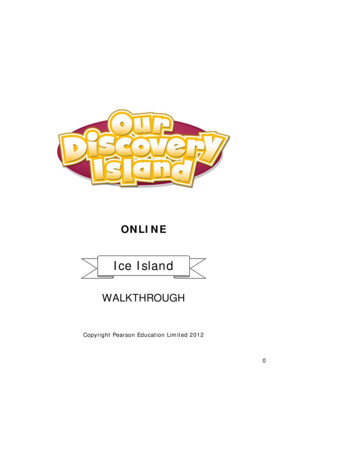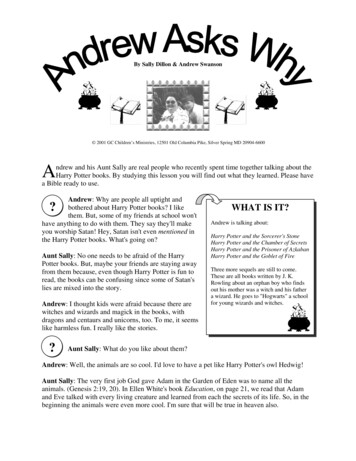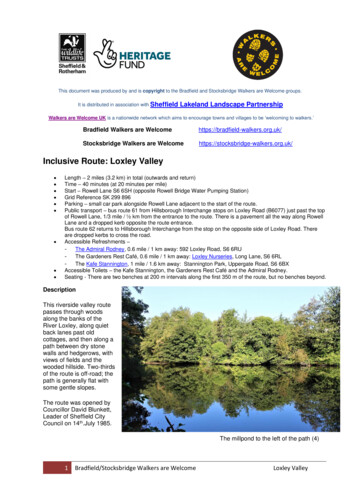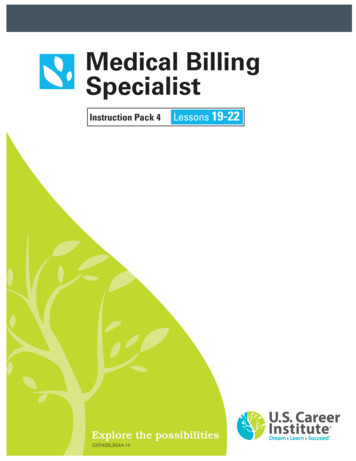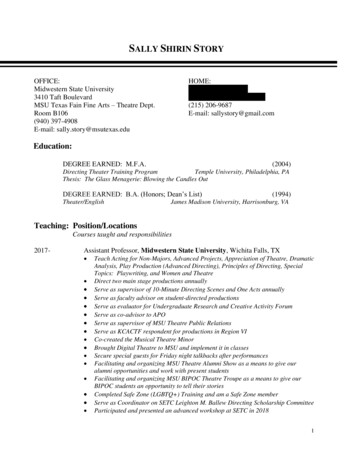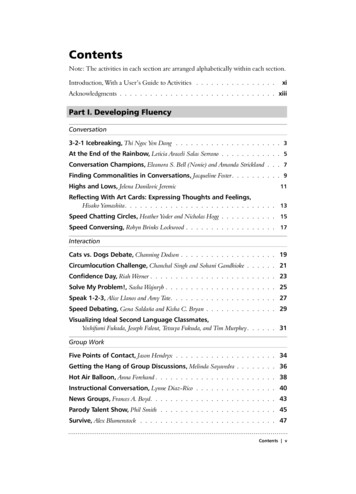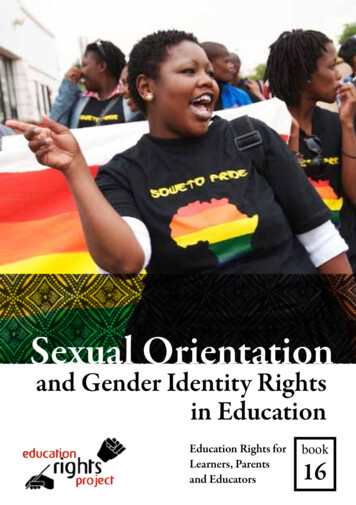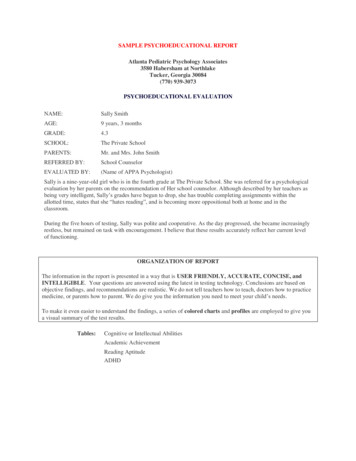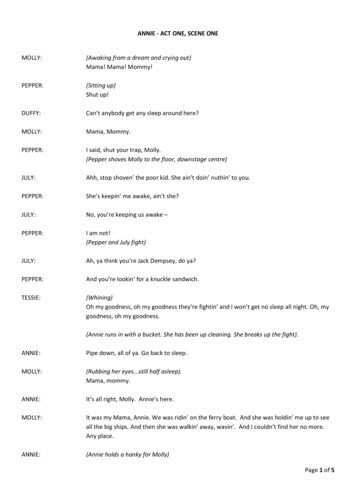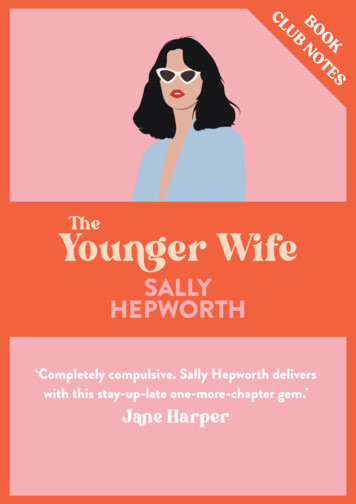
Transcription
SKO TEBO NOBUCLTheYounger WifeSALLYHEPWORTH‘Completely compulsive. Sally Hepworth deliverswith this stay-up-late one-more-chapter gem.’Jane Harper
About the bookThe moment she laid eyes on Heather Wisher, Tully knew this woman was going to destroy their lives.Tully and Rachel are murderous when they discover their father has a new girlfriend. The fact thatHeather is half his age isn’t even the most shocking part. Stephen is still married to their mother, whois in a care facility with end-stage Alzheimer’s disease.Heather knows she has an uphill battle to win Tully and Rachel over, while carrying the burden of thesecrets of her past. But, as it turns out, they are all hiding something.The announcement of Stephen and Heather’s engagement threatens to set off a family implosion,with old wounds and dark secrets finally being forced to the surface.A garage full of stolen goods. An old hot-water bottle, stuffed with cash. A blood-soaked wedding.And that’s only the beginning . . .About the authorSally Hepworth is the New York Times bestselling author of six novels, most recently The Good Sister(2020), which was an instant bestseller. Her novel, The Mother-In-Law (2019) has been optionedfor a TV series by Hollywood actress and producer, Amy Poehler. Drawing on the good, the bad andthe downright odd of human behaviour, Sally writes incisively about family, relationships and identity.Her domestic thriller novels are laced with quirky humour, sass and a darkly charming tone. Sally’snovels are available worldwide in English and have been translated into 20 languages. Sally lives inMelbourne, Australia with her husband, three children and one adorable dog.EGPA2
Fatherly love‘He held up his hand like a stop sign and Rachel fell silent. Such was the effect a father had onyou, even though she was in her thirties.’ (page 68)‘A father was the benchmark that told you what to expect. What to accept. And, perhaps mostimportantly, what to believe about yourself.’ (page 299)1. The novel explores the significance of father–daughter relationships, and the way womencan be shaped by this relationship. Both Rachel and Tully seem to strive for their father’sapproval in a way they don’t do with their mother. Why do you think this is?2. Heather’s relationship with her father tainted the way she viewed Stephen, and herrelationship with him. Do you think it’s true that women are ‘doomed to marry theirfathers’, as many people believe? Why/why not?Family‘It was all the confirmation Heather needed that her suspicions about Rachel was true. It madeher wonder about the Aston family, ostensibly so close, and yet completely blind to somethingHeather had been able to extract in a couple of minutes ’ (page 101)‘How often had she taken pride in how wonderfully civilised her family was, how they knew theright way to behave, the right way to do things? It turned out they were so civilised they didn’thave a huge number of good friends.’ (page 302)3. Both Rachel and Tully acknowledge that they’ve grown much closer in recent months thanthey otherwise have been. What do you think is behind this? What do you think might havecontributed to their lack of closeness growing up?4. On page 226, Rachel’s narrative states that the Astons ‘weren’t exactly a conservativefamily’. Do you think this is true, given the number of things that went unspoken withintheir family? Or do you think this is how they chose to see themselves?‘Sometimes Rachel envied Tully’s propensity for wild reactions. It seemed healthier somehowto get all those feelings out. Sometimes she pictured her own insides, full of all the things she’dpushed down over the years rather than articulated. She imagined a series of ugly deposits,masses of secrets and regret, wedged around her lungs and stomach.’ (page 19)5. What does this tell you about how Rachel processes her feelings? How much of this do youthink is due to her being raped at sixteen, and how much to her upbringing?6. Both Tully and Rachel, in different ways, seek control as a method of coping. Do you thinktheir upbringing contributed to these tendencies? In what way?7. The Astons, despite ostensibly being a very warm and open family, seem to devote a lot ofEGPA3
energy to pretending everything is fine. In what ways do you think Rachel and Tully mighthave been different had the family discussed things more openly?8. Do you think Stephen and Pam missed the obvious signs of Rachel’s sexual assault, or doyou think they chose not to see them? How do you think they’d have reacted if Rachel hadtold them? Why do you think she chose not to?Class and privilege‘It was little wonder she looked confused. It was, after all, a high-end practice in a very nicearea. The serious woman likely spent her days talking to women who thought they had problemsbecause their husbands couldn’t send them first class to Europe for the second time this year.’(page 119)9. Tully seems to believe that people with money don’t have ‘real’ problems. What do you thinkhas led her to this conclusion? Do you agree with her?10. What does Tully learn from her experiences living in a new, less affluent area, and doing hercommunity service?11. Tully in particular feels enormous pressure to keep up appearances. How much of thatpressure do you think is external, driven by society, and how much comes from within?12. Rachel makes a lot of assumptions about how Darcy supports himself, and what might haveled to his sustained unemployment, but it never seems to occur to her that the COVID-19pandemic might have contributed to this. Does this strike you as odd, given that her cakemaking business would surely have been similarly affected? What does this tell you aboutthe world she lives in?13. Heather has gone to great pains to reinvent herself as a member of the middle–upper class.How do you think her childhood affected her beliefs around class, and the ways it can affectan individual’s life path? Do you think she was right in these beliefs?Justice and redemption‘Perhaps the very worst people still had some good in them. And perhaps the very best hadsome bad.’ (page 312)14. The three women resolve at the end of the book that Stephen really was abusive, and takeconfidence from each other in this. But they never got a confession or found proof. Howdid you feel about Rachel’s actions in light of this? Did Stephen deserve to be ‘innocentuntil proven guilty’, or, in this scenario, was Rachel right to act?15. Did you find the ending satisfying, or unsettling? Would you have preferred to knowwhether or not Stephen was, in fact, abusive?EGPA4
Other16. Wine features heavily in several key scenes in this novel. Do you think the drinking depictedhere is reflective of Australian society? Did you find it excessive?17. Did you agree with Stephen that Heather’s drinking was problematic? If not, why do youthink he was so concerned about it?18. The novel is set in a post-COVID world, referring to Melbourne’s strict lockdowns as a thingof the recent past. Did you feel comfortable with this setting? Has your experience of theCOVID-19 pandemic changed the way you feel about things like shaking hands, being incrowds, etc. Did you feel uncomfortable reading the wedding scene, where everyone wascrowded into the church?19. What conclusions did you begin to draw as you were reading the novel? Did you believe thatStephen was abusive, or did you think Heather was an unreliable narrator?20. This novel paints a vivid picture of the subjective, tenuous nature of memory. How do youthink our ‘self-editing’ of our memories affects the way we view the world, and ourselves?21. Tully puts a lot of pressure on herself to be a ‘good’ mother. But what makes a ‘good’parent? In what ways do you think society’s expectations have changed the experience ofparenthood in recent years?EGPA5
About the book The moment she laid eyes on Heather Wisher, Tully knew this woman was going to destroy their lives. Tully and Rachel are murderous when they discover their father has a new girlfriend. The fact that Heather is half his age isn't even the most shocking part. Stephen is still married to their mother, who
